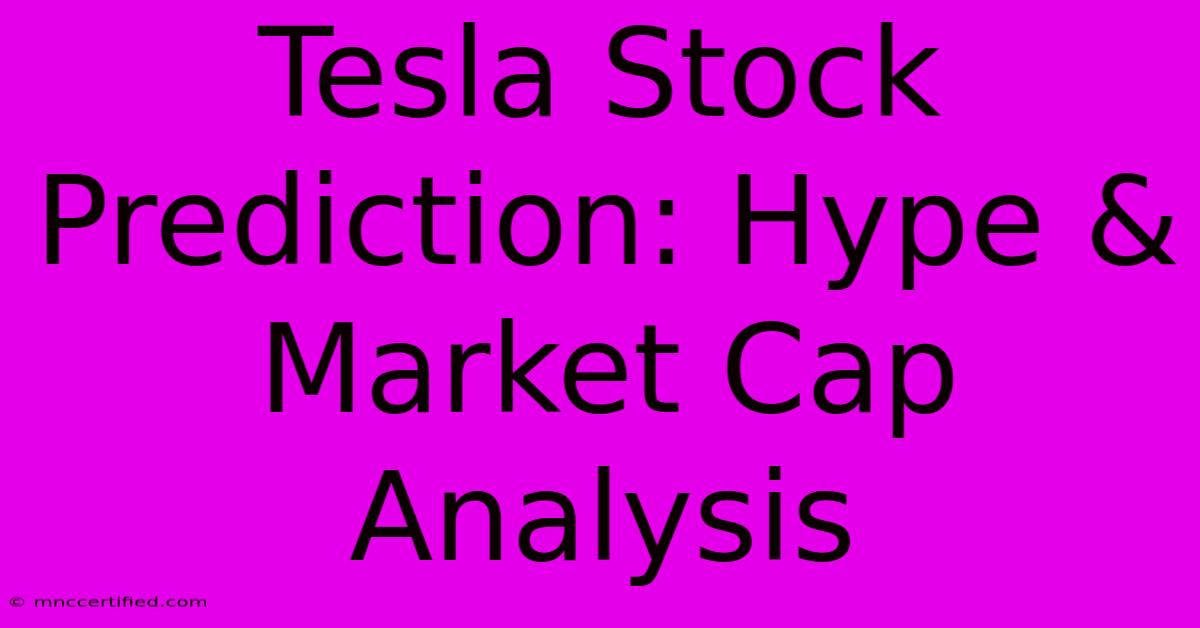Tesla Stock Prediction: Hype & Market Cap Analysis

Table of Contents
Tesla Stock Prediction: Hype & Market Cap Analysis
Tesla, the electric vehicle (EV) giant, has consistently been a hot topic in the financial world. The company's innovative technology, ambitious growth plans, and charismatic CEO, Elon Musk, have all contributed to its remarkable rise in stock price. However, the question remains: is the current hype justified, and can Tesla sustain its astronomical market cap?
This article delves into the complex factors that influence Tesla's stock prediction, including its market capitalization, financial performance, competition, and future outlook. By understanding these elements, investors can better evaluate the potential risks and rewards of investing in Tesla stock.
Understanding Tesla's Market Cap
Tesla's market cap, currently exceeding $800 billion, is staggering. This massive valuation surpasses even established automotive giants like Toyota and Volkswagen. It's essential to consider why investors are so bullish on Tesla.
Here are some key factors:
- Dominant market share in the EV sector: Tesla enjoys a significant lead in the EV market, capturing a substantial portion of EV sales globally.
- Innovation and technology: Tesla consistently pushes the boundaries of EV technology, with features like Autopilot and Full Self-Driving capability attracting consumers.
- Brand loyalty and customer enthusiasm: Tesla boasts a highly dedicated fanbase, eager to embrace the company's vision for a sustainable future.
- Elon Musk's influence: Musk's charismatic personality and bold vision inspire investor confidence, driving market hype and attracting significant investment.
Analyzing Tesla's Financial Performance
While Tesla's market cap is impressive, its financial performance has been subject to scrutiny.
- Profitability: Despite strong revenue growth, Tesla's profitability has been inconsistent. The company has faced challenges in controlling costs and navigating supply chain disruptions.
- Valuation multiples: Tesla's price-to-earnings (P/E) ratio has been significantly higher than its competitors, raising concerns about its sustainability.
- Growth prospects: Tesla's ambitious expansion plans, including new factories and vehicle models, pose both opportunities and risks.
Navigating the Competition
The EV market is rapidly expanding, and Tesla faces growing competition from established automakers like Ford, Volkswagen, and General Motors, all investing heavily in electric vehicles. Furthermore, startups like Lucid Motors and Rivian are challenging Tesla in the luxury EV segment.
Forecasting Tesla's Future
Predicting Tesla's future stock performance is challenging, with numerous factors influencing its trajectory.
- Market adoption of EVs: The widespread adoption of EVs is crucial for Tesla's continued growth. Governments and consumers must embrace EVs to sustain the market demand.
- Technological advancements: Maintaining its technological edge is paramount for Tesla's success. Staying ahead of the competition in areas like autonomous driving and battery technology is essential.
- Regulatory landscape: Government policies and regulations, including tax incentives and emissions standards, can significantly impact the EV market.
- Elon Musk's influence: Musk's visionary leadership and unpredictable nature have influenced Tesla's stock performance. His actions and pronouncements can significantly impact investor sentiment.
Conclusion
Tesla's stock performance is driven by a complex interplay of market hype, financial performance, competition, and future prospects.
Investors must carefully consider these factors before making any investment decisions. The current market cap suggests significant investor optimism, but it's essential to recognize the inherent risks associated with such a high valuation.
While Tesla's innovative technology and ambitious growth plans hold promise, the company's profitability and market position remain subject to uncertainty. Ultimately, the future of Tesla stock depends on its ability to deliver on its promises and navigate a rapidly evolving market.

Thank you for visiting our website wich cover about Tesla Stock Prediction: Hype & Market Cap Analysis. We hope the information provided has been useful to you. Feel free to contact us if you have any questions or need further assistance. See you next time and dont miss to bookmark.
Featured Posts
-
Couple Alert Megan Fox Mgk Expect First Child
Nov 12, 2024
-
Safe Travels Elite Insurance Reviews
Nov 12, 2024
-
Businesses Closed On Veterans Day Guide
Nov 12, 2024
-
Napoli Boss Conte Blasts Var After Tie
Nov 12, 2024
-
What Insurance Does Riverside Accept
Nov 12, 2024